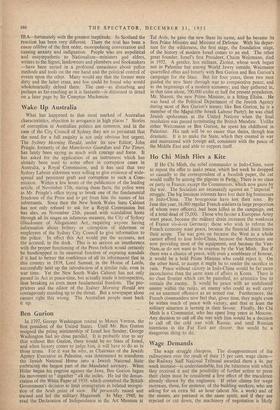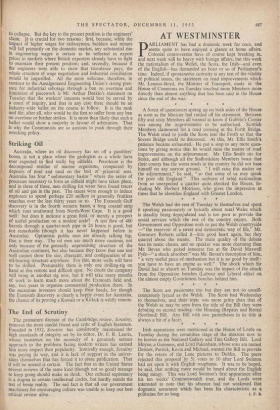Wage Demands
The wage struggle sharpens. The disappointment of the railwaymen over the result of their 15 per cent. wage claim— the Railway Staff National Tribunal awarded them a 4s. per week increase—is understandable, but the bitterness with which they received it and the possibility of further action to press their claim must be considered a first effect of the truculence already shown by the engineers. If other claims for wage increases, those, for instance, of the building workers, who are asking for an extra 9d. an hour (about 30s. a week) and of the miners, are pursued in the same spirit, and _if they are rejected or cut down, the machinery of negotiation is likely to collapse. But the key to the present position is the engineers' claim. It- is crucial for two reasons : first, because, while the impact of higher wages for railwaymen, builders and miners will fall primarily on the domestic market, any substantial rise in engineering wages is certain to be reflected in export Prices in markets where British exporters already have to fight to maintain their present position; and, secondly, because if the engineers were able to show that truculence pays, the whole structure of wage negotiation and industrial conciliation would be imperilled. All the more welcome, therefore, in contrast to the Amalgamated Engineering Union's strong pres- sure for industrial sabotage through a ban on overtime and limitation of piecework is Mr. Arthur Deakin's statement on Tuesday that the workers' interests would best be served by a court of inquiry, and that in any case there should be an industry-wide ballot on the course to follow. It is the rank and file, after all, who would be the first to suffer from any ban on overtime or further strikes. It is more than likely that such a ballot would show a majority in favour of arbitration. That is why the Communists are so anxious to push through their wrecking policy.



































 Previous page
Previous page